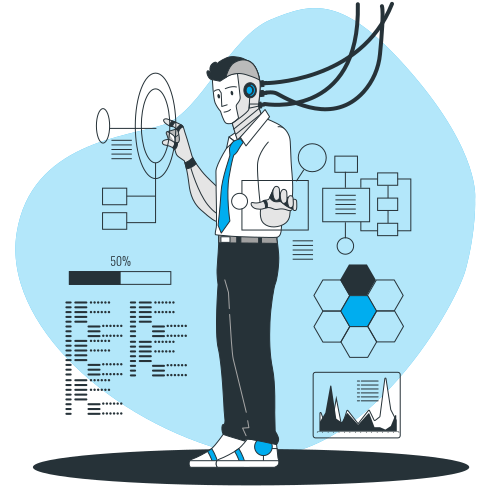
Artificial Intelligence (AI) has revolutionized numerous industries, and now it's making its way into corporate learning programs. With the advancement of AI technologies, organizations can harness the power of machine learning, natural language processing, and data analytics to enhance employee training and development.
In this blog post, we will explore the potential impact of AI on corporate learning programs and how it can revolutionize the way businesses educate and upskill their workforce.
Personalized Learning Experience
One of the key benefits of AI in corporate learning programs is the ability to deliver personalized learning experiences. Traditional training methods often take a one-size-fits-all approach, which may not cater to the individual needs and preferences of employees.
However, with AI, organizations can leverage data analytics to assess each employee's strengths, weaknesses, and learning styles. By analyzing this data, AI algorithms can generate personalized learning paths, suggesting relevant courses, resources, and activities to optimize the learning experience for each individual. This level of personalization improves engagement, knowledge retention, and overall training effectiveness.
Intelligent Content Curation
In today's information-rich world, finding the right content for learning can be overwhelming. AI-powered systems can alleviate this challenge by intelligently curating content based on learners' interests and skill gaps.
By leveraging natural language processing, AI algorithms can analyze vast amounts of data, including articles, videos, and online courses, to identify the most relevant and valuable resources for employees. This curated content can be tailored to specific roles, industries, or skill levels, enabling learners to access the most up-to-date and pertinent information quickly and efficiently.
Virtual Mentoring and Coaching
Mentoring and coaching play a vital role in employee development, but they can be limited by factors such as time constraints and resource availability. AI can bridge this gap by providing virtual mentoring and coaching experiences.
Chatbots powered by AI can simulate human-like interactions, offering guidance, feedback, and support to employees. These virtual mentors can answer questions, provide explanations, and even offer personalized recommendations based on an individual's progress and performance. This enables learners to access guidance and coaching whenever they need it, fostering continuous learning and skill improvement.
Intelligent Performance Analytics
AI-driven analytics can significantly enhance the measurement and analysis of employee performance and learning outcomes. Traditional assessment methods often rely on subjective evaluations or periodic examinations, which may not provide a comprehensive understanding of an employee's capabilities.
With AI, organizations can gather real-time data on employee performance, engagement, and learning progress. AI algorithms can then analyze this data, identify patterns, and provide valuable insights into individual and group performance. This enables organizations to make data-driven decisions regarding training effectiveness, identify skill gaps, and allocate resources efficiently to address specific areas of improvement.
Augmented Reality and Simulation
AI can also enhance corporate learning programs by leveraging augmented reality (AR) and simulation technologies. By combining AI algorithms with AR, organizations can create immersive learning experiences that simulate real-world scenarios. This enables employees to practice and refine their skills in a safe and controlled environment.
For instance, in industries such as healthcare or manufacturing, employees can undergo virtual simulations to enhance their technical skills or develop crisis management abilities. These simulations not only boost engagement but also improve knowledge application and critical thinking.
Continuous Learning and Adaptive Training
AI facilitates continuous learning by enabling adaptive training programs. Traditional training often follows a fixed curriculum or timeline, which may not accommodate the diverse learning needs of employees.
AI-powered systems, on the other hand, can adapt and adjust the learning content and pace based on the individual's progress, performance, and feedback. This adaptive approach ensures that employees receive the right level of challenge and support, maximizing their learning outcomes.
Furthermore, AI algorithms can track and analyze emerging trends and technologies, providing organizations with insights into the skills employees need to develop to stay ahead in an ever-evolving business landscape.
Conclusion
As AI continues to advance, its impact on corporate learning programs is becoming increasingly profound. From personalized learning experiences to intelligent content curation, virtual mentoring, and augmented reality, AI offers a myriad of opportunities to transform how organizations educate and upskill their workforce.
By harnessing the power of AI technologies, businesses can enhance engagement, knowledge retention, and performance outcomes. The future of corporate learning lies in the hands of AI, and organizations that embrace this technology will gain a competitive edge by fostering a culture of continuous learning and development.
